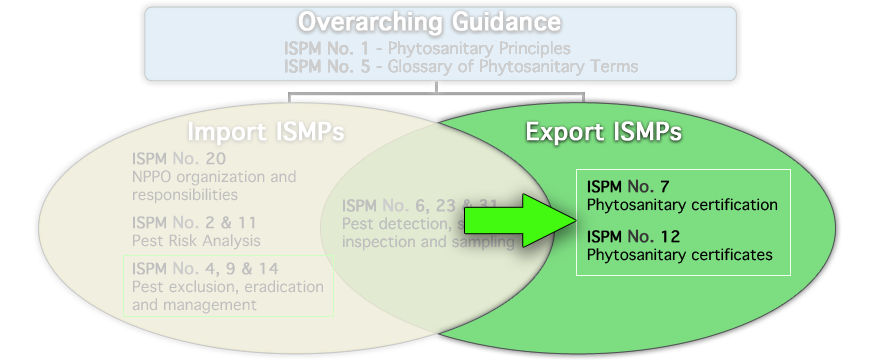Lesson 6: ISPMs and the NPPO
Topic 3: Export Systems and Operations
NPPOs are required to certify that their exported consignments meet the phytosanitary requirements of importing countries. ISPMs 7 and 12 provide guidance on phytosanitary certification.
Objectives:
- Describe NPPO responsibilities, resources, and infrastructure of a phytosanitary certification system (ISPM 7)
- Describe the information contained in a phytosanitary certificate (ISPM 12)
Phytosanitary Certification
The IPPC requires exporting countries to make arrangements for a system to provide assurance to importing countries that consignments meet the importing country’s phytosanitary requirements.

ISPM 7: Phytosanitary Certification
Category:
Export systems and operations
Purpose of the standard:
The purpose of ISPM 7 is to describe components of a phytosanitary certification system.
Summary of standard:
The NPPO of the exporting country has the sole legal authority to develop and maintain a phytosanitary certification program. In order to maintain this program, the NPPO of the exporting country should have the following resources and infrastructure:
- Adequately trained personnel
- Current information on phytosanitary import requirements
- Technical information on regulated pests
- Adequate materials to carry out sampling, inspection, testing, treatment, consignment verification, and other phytosanitary certification procedures
- Equipment and facilities to carry out required testing, etc.
Operational responsibilities of the NPPO in developing a phytosanitary certification program include:
- Inspect, sample, and test plant products and other articles for the purpose of phytosanitary certification
- Detect and identify pests
- Perform, supervise, or audit phytosanitary treatments
- Complete and issue phytosanitary certificates
ISPM 12: Phytosanitary Certificates
Category:
Export systems and operations
Purpose of the standard:
The purpose of ISPM 12 is to describe the requirements and guidelines for preparing and issuing phytosanitary certificates for export. A phytosanitary certificate (PC) is issued by the NPPO of the country where plants or plant products are grown or processed to indicate that consignments meet the phytosanitary requirements of importing countries.
Summary of the standard:
Relevant information regarding phytosanitary certificates (PCs) includes the following. Each PC contains a unique identifying number, the names of the importing and exporting countries, a description of the consignment, a statement certifying that the consignment is free from quarantine pests and meets other requirements of the importing country, information on disinfestation or treatment, and the NPPO stamp, seal, and signature of an authorized officer. Additional information related to regulated pests that is required by the importing country is supplied in an “additional declaration”. The standard provides for electronic certification, where accepted by the importing country NPPO. The standard contains model phytosanitary certificates for export or re-export, recommended wording for additional declarations, and a blank appendix on electronic certification, which is currently being developed.
Phytosanitary certification and phytosanitary certificates are a way exporting countries can maintain harmonization with importing countries and ensure pest risk remains low.
To continue, select Topic 4 from the Topics menu above or click here.